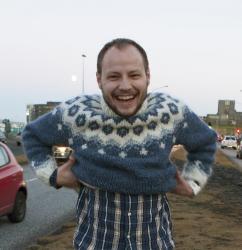If you’ve ever stopped along Reykjavík’s waterfront to ogle the magnificent mountainess known as Esja, you’ve probably seen some little buildings scattered about her feet. That is Kjalarnes, the site of the only Saga to take place within sight of our modern capital city. It’s even now technically part of the city of Reykjavík, so this is the closest thing to a Saga of the People of Reykjavík that we have. Amidst a summer of recapping Sagas taking place as far east as Russia and west as Canada, we’re now going to take a quick rest back at home to explain where Esja gets her name.
Irelandic Saga
Some Irish guy has pissed off the king for unexplained (probably Christian) reasons, so his conventient kinsman/Bishop sends him (along with a bunch of other Irish Christians) to Kjalarnes. He promises that the pagan chieftain of that region isn’t too much of a dick to Christians. He’s like, “Take this very important Christian dirt and put a Christian church on it,” and they’re all like, “Sure, whatever.”
Chieftain Helgi Bjóla welcomes all the Christians and they are allotted places to live and begin integrating into society. (Please allow yourself a moment for a bitter LOL at the irony of medieval Icelandic officials actually being kinder to asylum seekers of different faiths and nationalities than those in 2016. Double-bitter ROFL for the irony of “The Dublin Regulation.”)
The big, buff Irish dude, Andríður, swears the oaths of brotherhood with Helgi’s sons. He also marries a hot and rich Icelander named Þuríður and they have a son named Búi. Esja, a wealthy Irish widow with mad skills in magic—a rich witch, if you will—takes him in as her foster son. He’s naturally peaceable and opts out from practicing pagan sacrifice.
Fascister than a speeding slingshot
Unluckily for him, the chieftaincy has passed on from the compassionate Helgi to his shitty, fascistic son Þorgrímur. His equally shitty, even more fascistic son Þorsteinn prosecutes Búi for not paying his sacrificial dues to the official religion and sentences him to full outlawry. When he refuses to leave, these assholes (let’s just call them UTL for fun) ambush him on his way between his mother and his foster-mother, but he holds them off with his trusty slingshot until his mother casts some kind of spell of darkness to hide him from his enemies while he escapes.
When Búi checks the time the next day, it’s revenge o’ clock on the dot, so he sneaks up behind Þorstein while he’s praying and crushes his skull, burns down his whole temple, and then goes into hiding. The sentiment is understandable, but lezbehonist, that’s just excessive. After they search Esja’s house (without her consent) and find nothing, Þorgrímur and his kinsman go to the home of Andríður, their own blood-brother. While his wife screams and offers money instead, they drag him out and kill the shit out of him.
Esja tells Búi that she will not be able to hide and protect him much longer, so he sets off for Norway. The king there is pagan and feeling pretty salty about Búi burning down the temple. He says he’ll only let Búi live if he fetches a board game from the troll-king in the mountains, so Búi sets off to do so.
1. Be a Helgi, not a Þorsteinn, and definitely not a Þorgrímur.
2. Killing people is bad. Killing institutions that kill people, allow people to be killed, or put people in danger of being killed, is good. Burn those motherfuckers down—but without killing anyone.
Trolls gonna troll
He ends up shacking up with the troll-princess, who quickly gives birth to a bearded baby. That’s right. A motherfucking baby with a motherfucking beard. Búi ditches them and returns the board game to the Norwegian king, who then makes him fight an evil troll called “the black man.” (I’ll let that fucked-up-ness speak for itself.) Upon killing him, he returns to Iceland to discover he has an illegitimate child.
Child aside, the family feud is casually settled now that everyone has chilled the hell out and Búi marries Þorgrímur’s daughter Helga. One day, a twelve-year-old boy shows up and says, “You’re my dad!” Búi’s like, “No, I’m not, let’s wrestle about it.” But the boy wins because Búi’s legs are magically whipped out from under him, probably by the spell of a certain scorned single-mom-troll somewhere.
Fact: moms gonna protect their children, with magic if necessary. Búi dies, which is probably for the best because he turned out not to be the most Christ-like of Christians. Welcome to Iceland, and Christianity, and the world.
Buy subscriptions, t-shirts and more from our shop right here!
















